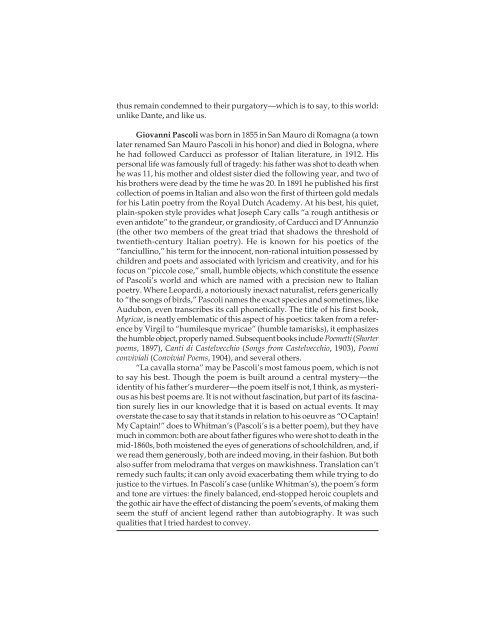Journal of Italian Translation
Journal of Italian Translation
Journal of Italian Translation
Create successful ePaper yourself
Turn your PDF publications into a flip-book with our unique Google optimized e-Paper software.
thus remain condemned to their purgatory—which is to say, to this world:<br />
unlike Dante, and like us.<br />
Giovanni Pascoli was born in 1855 in San Mauro di Romagna (a town<br />
later renamed San Mauro Pascoli in his honor) and died in Bologna, where<br />
he had followed Carducci as pr<strong>of</strong>essor <strong>of</strong> <strong>Italian</strong> literature, in 1912. His<br />
personal life was famously full <strong>of</strong> tragedy: his father was shot to death when<br />
he was 11, his mother and oldest sister died the following year, and two <strong>of</strong><br />
his brothers were dead by the time he was 20. In 1891 he published his first<br />
collection <strong>of</strong> poems in <strong>Italian</strong> and also won the first <strong>of</strong> thirteen gold medals<br />
for his Latin poetry from the Royal Dutch Academy. At his best, his quiet,<br />
plain-spoken style provides what Joseph Cary calls “a rough antithesis or<br />
even antidote” to the grandeur, or grandiosity, <strong>of</strong> Carducci and D’Annunzio<br />
(the other two members <strong>of</strong> the great triad that shadows the threshold <strong>of</strong><br />
twentieth-century <strong>Italian</strong> poetry). He is known for his poetics <strong>of</strong> the<br />
“fanciullino,” his term for the innocent, non-rational intuition possessed by<br />
children and poets and associated with lyricism and creativity, and for his<br />
focus on “piccole cose,” small, humble objects, which constitute the essence<br />
<strong>of</strong> Pascoli’s world and which are named with a precision new to <strong>Italian</strong><br />
poetry. Where Leopardi, a notoriously inexact naturalist, refers generically<br />
to “the songs <strong>of</strong> birds,” Pascoli names the exact species and sometimes, like<br />
Audubon, even transcribes its call phonetically. The title <strong>of</strong> his first book,<br />
Myricae, is neatly emblematic <strong>of</strong> this aspect <strong>of</strong> his poetics: taken from a reference<br />
by Virgil to “humilesque myricae” (humble tamarisks), it emphasizes<br />
the humble object, properly named. Subsequent books include Poemetti (Shorter<br />
poems, 1897), Canti di Castelvecchio (Songs from Castelvecchio, 1903), Poemi<br />
conviviali (Convivial Poems, 1904), and several others.<br />
“La cavalla storna” may be Pascoli’s most famous poem, which is not<br />
to say his best. Though the poem is built around a central mystery—the<br />
identity <strong>of</strong> his father’s murderer—the poem itself is not, I think, as mysterious<br />
as his best poems are. It is not without fascination, but part <strong>of</strong> its fascination<br />
surely lies in our knowledge that it is based on actual events. It may<br />
overstate the case to say that it stands in relation to his oeuvre as “O Captain!<br />
My Captain!” does to Whitman’s (Pascoli’s is a better poem), but they have<br />
much in common: both are about father figures who were shot to death in the<br />
mid-1860s, both moistened the eyes <strong>of</strong> generations <strong>of</strong> schoolchildren, and, if<br />
we read them generously, both are indeed moving, in their fashion. But both<br />
also suffer from melodrama that verges on mawkishness. <strong>Translation</strong> can’t<br />
remedy such faults; it can only avoid exacerbating them while trying to do<br />
justice to the virtues. In Pascoli’s case (unlike Whitman’s), the poem’s form<br />
and tone are virtues: the finely balanced, end-stopped heroic couplets and<br />
the gothic air have the effect <strong>of</strong> distancing the poem’s events, <strong>of</strong> making them<br />
seem the stuff <strong>of</strong> ancient legend rather than autobiography. It was such<br />
qualities that I tried hardest to convey.
















